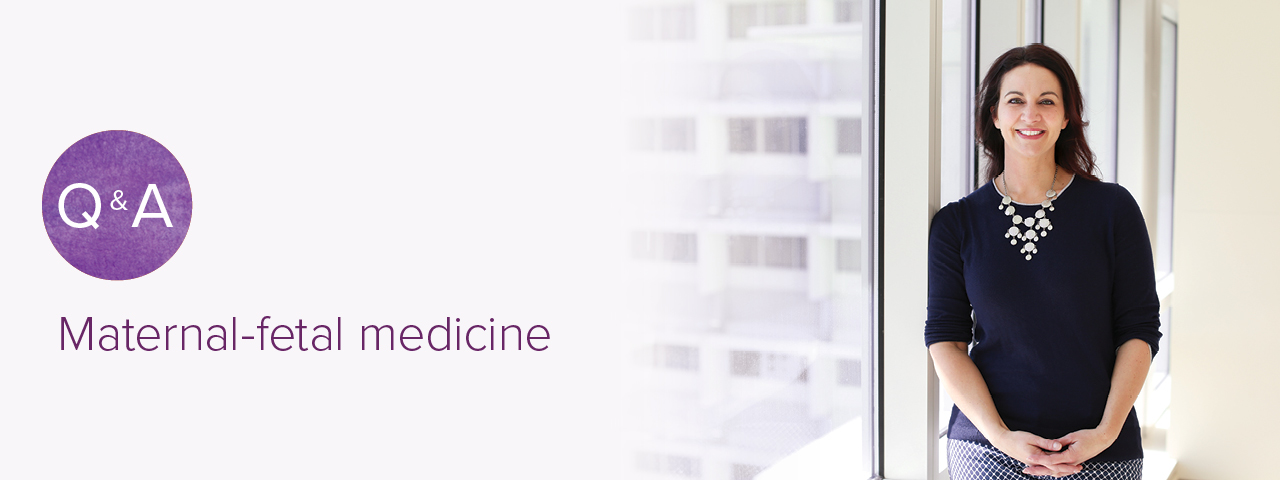Véronique Taché, M.D., is an assistant professor in the Department of Obstetrics and Gynecology’s Division of Maternal Fetal Medicine, where she specializes in caring for women with high-risk pregnancies and collaborates daily with colleagues across multiple disciplines on maternal and fetal health issues.
Q. What sparked your interest in maternal-fetal medicine, and especially high-risk pregnancies?
A. In medical school, I loved my labor and delivery experience. It was truly remarkable assisting women through childbirth. I see that awe in some of our medical students today when they rotate with us, and I get that same feeling that I did when I was a student. In residency, I was definitely more drawn to the obstetrical training and the more complex patients. I found ultrasounds fascinating: looking at a fetus through the mother to assess health and wellbeing. It was a puzzle I had to figure out.
Q. Can you describe your role in the spectrum of multidisciplinary maternal-fetal care and research here?
A. As a tertiary care center, UC Davis Medical Center welcomes patients with a variety of issues. Each “patient” is defined as both the mother and fetus, so we really have (at least) two people to think about in that sense. Issues can be maternal, fetal or both. For mothers, problems can include medical complications (for example underlying cardiac diseases, cancer, or autoimmune disorders such as lupus) or pregnancy-related complications (such as early-onset preeclampsia, twin and triplet pregnancies). For the fetus, issues include growth abnormalities, particularly when they aren’t growing well, or birth defects.
We’re fortunate to work with a range of specialists within the health system to ensure the best care for our patients. A typical group included in just one patient’s care might consist of a general obstetrician, prenatal genetic counselor, maternal-fetal medicine specialist, radiologist, anesthesiologist and pediatrician/neonatologist. In some circumstances, a pediatric cardiologist or fetal surgeon, or an adult medical subspecialist, can be involved. These amazing specialists are readily available to see our patients.
Q. What are your thoughts on current trends in maternal-fetal medicine? What’s new and on the horizon, and how is this coming into play at UC Davis?
A. In general, we are seeing women with more and more health issues like diabetes, obesity and hypertension, and each of these problems has its own impact on the pregnancy and fetus. We’re developing ways to best address those needs to improve outcomes. For example we have focused specialty clinics, like those specifically dedicated to endocrine issues and diabetes in pregnancy, as well as general high-risk clinics. There are allied health specialists to help address additional issues.
Also we’re better able now to diagnose fetal birth defects and complications earlier, and we’re now counseling and intervening at earlier gestational ages. The UC Davis Fetal Care and Treatment Center, which includes our team of fetal surgeons, is now equipped to better treat a wide range of birth defects and pregnancy complications, such as neural tube defects and twin-to-twin transfusion syndrome.
We also know that all complications do not result in happy endings. Some women have fetuses with significant abnormalities that can’t survive, even with the availability of fetal surgery. Some women have medical issues that make pregnancy extremely life-threatening. At UC Davis, we believe we should provide all care for all women, which means that we also have a team of family planning specialists to help women who decide that terminating is the right choice for them and their family.
Q. Can you share some current activities and future plans?
A. Most of my research is related to how we can constantly improve education for obstetrics and gyne- cology trainees. I live that role every day as the ob/gyn residency program director at UC Davis. I’m responsible for the education and training of our residents, who need to be skilled surgeons, manage pregnancies and deliveries, and care for a variety of primary care conditions. It’s a lot to teach in four years, all while instilling a sense of commitment to underserved populations and advocacy work. I truly love that part of my work.
I am also very interested in how pregnancy itself can be a window into a mother’s health later on in life. Certain high-risk complications during pregnancy can be associated with higher risks of cardiovascular disease down the road. This more recent epidemiologic data is important to discuss with women.
Q. You were part of the UC Davis team that played a role in local response and education on Zika. How do you strike the right balance between vigilance and alarm in an emerging situation?
A. When Zika was linked to birth defects in fall 2015, UC Davis Health was very quick to recognize this as a potential issue. We gathered specialists at all levels, including virology researchers, vector control, pediatric infectious disease and maternal-fetal medicine specialists. What’s challenging about the Zika virus is the rate at which new information is being released, as more is discovered. Counseling patients can be challenging because what I tell someone today may be different in six months. I try to avoid being too alarmist, particularly with patients who haven’t traveled to endemic areas. If we have a case of locally transmitted Zika in California, we’re fully prepared to adapt to our patients’ needs.


